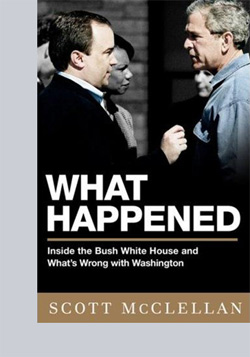 by: Will Bruzzo
by: Will Bruzzo
Take a look at what KUCI is reading this week:
Scott McClellan, the former Press Secretary for George W. Bush from 2003-2006, is the latest member of the Bush Administration to write a tell-all book aptly titled What Happened. Although the book came out several months ago, I felt a duty to painstakingly scrutinize it, especially given McClellan’s proximity to the inner circle of the Bush Administration and his long history with the President.
McClellan’s main objective is to explain the reasons behind the disaster that has become Bush’s presidency. He boils it down to an emphasis on the “permanent campaign” within the administration. The “permanent campaign” refers to the all-consuming effort to only please the political base and preserve the party in power, as opposed to making decisions in the best interest of the majority of the American People. While McClellan is probably correct in his assessment, the most notable portions of the book consist of his discussion of the Valerie Plame affair—of which he has unique firsthand knowledge.
The Plame affair should rank as the most serious transgression of the Bush years, and this idea is reinforced by McClellan’s book. Conservative columnist Robert Novak first exposed Ms. Plame’s covert CIA status after learning it from a state department official and having it confirmed by Karl Rove. This caused the CIA to request an investigation, since it is against the law to reveal the identity of a covert CIA operative. As the media storm began brewing, McClellan was required to answer the press’s questions about the source of the leak. McClellan was told personally by both Karl Rove and Scooter Libby that neither of them had anything to do with the leak, and McClellan, in turn, dutifully reported their denial to the press. In due time, it was discovered that Rove and Libby had both revealed Plame’s identity to various members of the press before she was revealed to Novak.
Some of these revelations arose from sworn hearings conducted by the Justice Department and resulted in the indictment (and conviction) of Mr. Libby. Mr. McClellan does not hide his anger at being misled by these two gentlemen, although it’s frankly surprising that he trusted them in the first place. By far the most insidious deception of McClellan—and by extension, the nation—was on September 29, 2003, when McClellan asked then-President Bush about the Plame affair. Bush confirmed that “I would fire anybody involved …” in the leak of Ms. Plame’s status. McClellan reported this to the media.
However, three years later, Bush was confronted with Libby’s grand jury testimony revealing that Bush himself had declassified the National Intelligence Estimate (NIE) that led to Plame’s outing. Bush belatedly admitted to McClellan that he had in fact authorized the release of the information.
In effect, if Bush had stuck to his pledge to fire whoever was involved with the leak, he would have had to fire himself.
It is unclear to me how Bush was able to remain in office after indulging in a campaign to discredit Plame’s husband; a campaign so reckless and mean-spirited that it resulted in the uncovering of a covert American spy. The latter seems to be an act tantamount to treason. It really gives perspective to the colossal disaster of the Bush Administration that such an act gets swept under the rug because the results of other corrupt decisions appeared to pose an even greater threat to the nation.
Share
|
|

